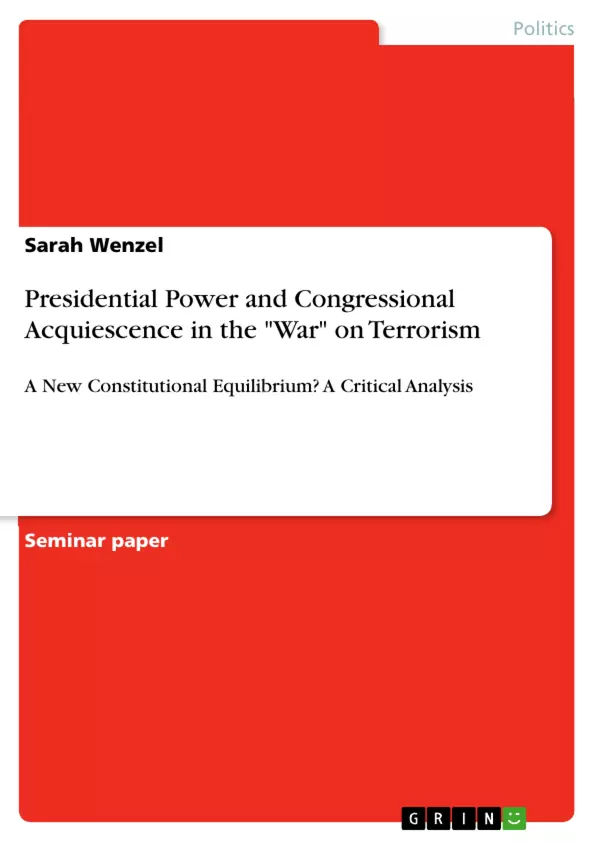In his article “Presidential Power and Congressional Acquiescence in the ‘War’ on Terrorism: A New Constitutional Equilibrium?” John E. Owens of the University of Westminster suggests the existence of a new constitutional equilibrium between the President and Congress in America. He builds his thesis on Burnham’s punctuated equilibrium theory and analyzes Bush’s policy and his war on terrorism.
In this essay I will explain the main thesis of the punctuated equilibrium theory at first, to build on that basis the critical analysis whether the system of Checks and Balances in the United States is or has been out of work and whether we can truly speak of a change of system. This will be checked by analysing the constitution, the role of the Congress and the presidency of George W. Bush. In a second part of this essay I will take up the punctuated equilibrium theory again and explain that the equilibrium of the American system has been punctuated but it was not pushed on a new level, but levelled off again on the old equilibrium and re-established the system of Checks and Balances.
Inhaltsverzeichnis (Table of Contents)
- Introduction
- Punctuated Equilibrium Theory
- The System of Checks and Balances out of Work?
- The Constitution
- The Congress and the President during the Administration of George W. Bush until 2006
- The Congress
- Imperial Presidency
- Conclusion
- Checking the Punctuated Equilibrium Theory after 2006
- Sources
Zielsetzung und Themenschwerpunkte (Objectives and Key Themes)
This essay aims to critically analyze John E. Owens' argument that a new constitutional equilibrium has been established between the President and Congress in the United States. The analysis builds on Burnham's punctuated equilibrium theory and examines the impact of the "war on terror" on presidential power and congressional acquiescence.
- Punctuated Equilibrium Theory and its application to US politics
- The system of checks and balances in the US Constitution
- The role of the President and Congress in the "war on terror"
- The concept of "imperial presidency"
- The implications of 9/11 for the constitutional balance of power
Zusammenfassung der Kapitel (Chapter Summaries)
- Introduction: The essay introduces John E. Owens' argument about a new constitutional equilibrium between the President and Congress, focusing on the impact of the "war on terror." It outlines the essay's structure and its critical analysis of Owens' thesis.
- Punctuated Equilibrium Theory: This section explains Burnham's theory, which posits that external shocks can disrupt existing political equilibria and lead to new configurations of power. The essay argues that the 9/11 attacks represent such a shock, enabling President Bush to expand his power.
- The System of Checks and Balances out of Work?: This section examines the constitutional framework for separating powers in the US, highlighting the historical shift towards presidential dominance. It compares the American presidential system to parliamentary democracies, exploring the potential for stagnation in a system with a strong separation of powers.
- The Constitution: This subsection focuses on the constitutional provisions outlining the roles of Congress and the President, particularly in the context of war powers. It explores the ambiguity in the Constitution regarding presidential authority in times of crisis, highlighting the potential for conflict between the two branches.
- The Congress and the President during the Administration of George W. Bush until 2006: This section examines the impact of 9/11 on the balance of power between the President and Congress. It highlights the challenges faced by Congress in responding to the crisis, including its size, internal divisions, and difficulties in coordinating action. It contrasts this with the President's advantages, including his single-person authority, direct access to information, and ability to adapt quickly to changing circumstances.
- The Congress: This subsection further analyzes the weaknesses of Congress in its relationship with the President, emphasizing its internal divisions, sluggishness in responding to crises, and tendency to delegate power due to a fear of blame. It argues that these factors contribute to the President's ability to assert his authority more easily.
Schlüsselwörter (Keywords)
Key concepts and themes in this essay include: punctuated equilibrium theory, presidential power, congressional acquiescence, constitutional equilibrium, "war on terror," checks and balances, separation of powers, imperial presidency, 9/11, George W. Bush, American political system.
Frequently Asked Questions
What is the "Punctuated Equilibrium Theory" in US politics?
This theory suggests that political systems are generally stable but can be disrupted by external shocks (like 9/11), leading to a new configuration of power between branches of government.
How did the "War on Terror" affect presidential power?
The essay analyzes how the crisis allowed President George W. Bush to expand executive authority, leading to what some scholars call an "Imperial Presidency."
Why does Congress often acquiesce to the President during crises?
Factors include internal divisions within Congress, its slower decision-making process compared to a single executive, and a tendency to delegate power to avoid blame for potential failures.
Did the US system of Checks and Balances fail after 9/11?
The essay investigates this question, arguing that while the equilibrium was "punctuated," the system eventually leveled off and re-established constitutional checks after 2006.
What is the main thesis of John E. Owens regarding constitutional equilibrium?
Owens suggested that a new, permanent constitutional equilibrium had been established favoring the President; the essay critically analyzes and challenges this view.
How does the US Constitution define war powers between Congress and the President?
The Constitution contains ambiguities regarding authority in times of crisis, which historically has led to shifts toward presidential dominance during wartime.
- Arbeit zitieren
- Sarah Wenzel (Autor:in), 2012, Presidential Power and Congressional Acquiescence in the "War" on Terrorism, München, GRIN Verlag, https://www.grin.com/document/471471



